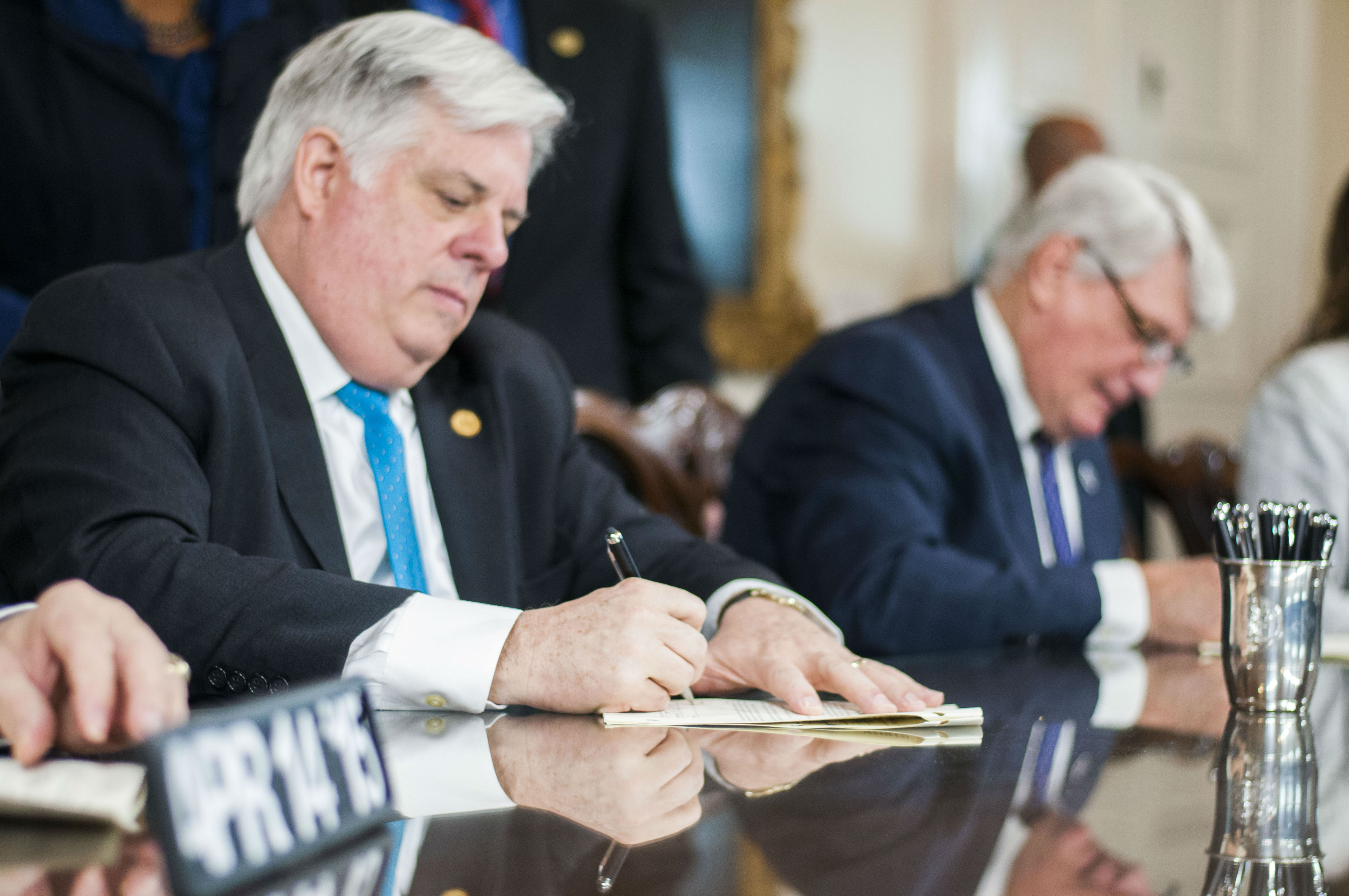Photo above: Gov. Larry Hogan and House Speaker Michael Busch at bill signing Tuesday.
By Rebecca Lessner
For MarylandReporter.com
Hard feelings from the just-finished legislative session spilled over into the Board of Public Works meeting Wednesday, as Gov. Larry Hogan used his seat as chairman to call out House Speaker Michael Busch.
“I’m not going to allow the petulant and unprecedented action by the Speaker, ignoring our supplemental budget, to go,” said Hogan, addressing a representative from the Maryland State Police who was testifying on police radios.
Hogan’s second supplemental budget included $8 million for 100 additional troopers and the reopening of the Annapolis barracks.
Hogan asked Major John Hasenei commander of the Office of Technology Management, to tell the Secretary of State Police, Col. William Pallozzi, that Hogan would “continue to push to open the Annapolis barracks, regardless of what the speaker says.”
“We’re going to fight to get those 100 troopers on the street, because I know you need them,” said Hogan.
Kopp defends Busch
State Treasurer Nancy Kopp, sitting next to Hogan, objected to politicizing the meeting of a board that approves state contracts and came to Busch’s defense.
“Everyone has different priorities and I appreciate that,” said Kopp, “But there isn’t just one way to view the world.”
Kopp, a former Democratic delegate recently re-elected to a fourth term as treasurer by the legislature, defended budget choices made this session. She said lawmakers were pushing for different spending priorities than the governor.
“I do know there are older citizens in their homes who hope to have community programs that won’t happen now, there are teachers in the schools that will have fewer teachers now, there are pregnant women that won’t have family health now,” said Kopp.
Hogan had started the meeting with a rehash of the session he has repeated several times since Monday, but the presence of the state police major triggered a nerve.
“Seeing you up here reminds me of the fact that the Speaker of the House refused to read our supplemental budget across the desk, the first time that has happened in 25 years,” said Hogan. “Read across the desk” means to formally introduce a message in the House.
The governor asserted that Maryland is the only state in the country without a barracks in the capital.
$20 million saved on contract
The item before the board was $20 million in savings found by the state police in a contract with Motorola for radios they were purchasing to allow communications with all state and local radio systems. The inability for all state and local law enforcement and first responders to talk on the same radio system has been a longstanding homeland security issue.
Hogan thanked Hasenei for “proving the board right” in not granting a $20 million increase of money during the last BPW meeting. Instead Hogan insisted they find funds in existing contracts, which they did.
“As you move forward, if you could please identify another 20 million in savings,” said Comptroller Peter Franchot. The room laughed, releasing some of the tension created by the earlier criticism. Franchot was quite serious.
“I would like to ask you on behalf of the state of Maryland, to be as tough as possible in looking for another $20 million through this contract,” said Franchot, noting it was an overall $345 million contract over eight years. “So it can be recycled to resolve some of these disputes.”
Hogan suggested creating a plan to utilize the $20 million to fund his $8 million state barracks and police force.
“The scorecard right now is $20 million to the good, unless the governor takes $8 million of it,” said Franchot jokingly.
Importance of pension contribution
Where Hogan will use the $20 million in savings hasn’t been determined, but the comptroller believes it will go to fund the $75 million the legislature cut from the Maryland State Retirement and Pension System in order to fund school aid and state employees salaries.
“The only thing that will resolve the security of the pension funds is proper contributions,” said Franchot said after the meeting. “Since it was $75 million that they were talking about we gave them $20 million today. That’s only $55 million to go.”
Franchot says he is keeping his own “scorecard” of the extra funds returned to the state.
“I noticed that there were items in the legislative session…that were, compared to the entire budget, relatively small amounts,” said Franchot. “I’m going to very passionately help my folks with different beliefs about priorities.”



Hogan and Franchot are mistaken to believe $20 million of “savings” on the Motorola contract: (a) have actually been realized and, if so; (b) can be spent on pensions or police hiring or an Annapolis barracks.
DoIT requested the Board to reclassify this $20 million from the line item for buying radios to a contingency line item within the Motorola contract. Contingency spending of $20 million on a $345 million base contract seems reasonable because the rule of thumb on contingencies is 7.5 – 8.5% of base. In other words, contingency budget resources are not spendable elsewhere until the savings are proven to be realized, unless you think $1 can be used to buy $2.
Moreover, this Motorola contract is funded substantially by Federal grants whose terms require spending on specific goods or services. To the extent this $20 million is funded by those grants, the Federal money cannot be used for pensions or more state police resources.
Franchot should know better, Hogan clearly is on a steep learning curve.
I want tension in these sessions. From all sides. When everyone agrees, things slide through.